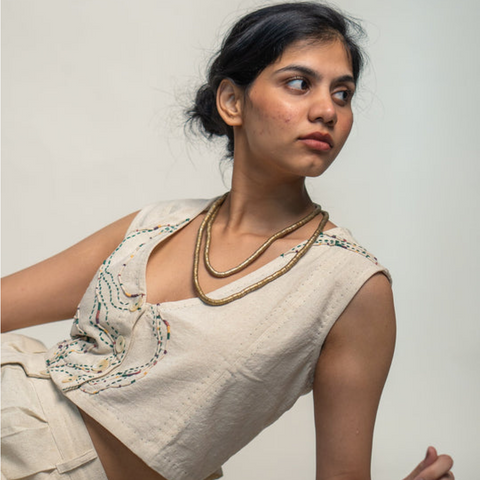Lafaani has its roots in Urdu and literally translates to ‘Immortality’.
Immortality truly conveys the essence of the brand- to curate merchandise that lives for many moons and isn’t ephemeral. By means of creating and using our handcrafted products, we are immortalising the labour and toil of all the artisans who breathed life into it.
Drishti Modi the Founder of the label throws light on the journey so far, read it here as she talks about the natural course that the brand took to get to where it is now, the educational paths that the founder and the co founder took to create a purpose driven label that embodies sustainability and makes it adaptable!
"My team member and close friend, Rashmick, and I co-founded a conscious apparel label named ‘Lafaani’ after years of deliberation, during the COVID lockdown.
While most people we meet tend to assume that we have a design background, the truth is far from it. Rashmick and I met while pursuing our post-graduation in Environmental Studies and Resources Management from TERI SAS. During the two-year program we were part of various research projects that involved understanding many aspects of environmental, economic, and societal challenges and their diverse nature in the different parts of the country; from comparing the sex-specific activity budget of Draco dussumieri in the Western Ghats to understanding the economic implications of rainwater harvesting in Bhikampura, a village in the western state of Rajasthan.
In our final semester, Rashmick stayed in a remote, water-stressed village in northern India for over 3 months to understand the challenges of water conservation and the impact of water degradation in the nearby villages and develop a water conservation plan that would then later be implemented by the local government and my partner NGO. While I worked with Tetra Pak to study the value chain of post-consumer waste, identifying recycling opportunities and working closely with authorities in the formalization of the Indian Waste Management Sector.
Soon after the end of the course, Rashmick became closely associated with WASH projects, from assessing the progress made by India’s mission to become open defecation free, to surveying menstrual hygiene practices and facilities for women in rural and suburban areas. I on the other hand took up a fellowship with Sustainable India Finance Facility supporting the State Government of Andhra Pradesh in their zero-budget natural farming (ZBNF) program to transition 6 million farmers from chemical farming to low-cost, low-input regenerative agriculture by 2024-25. To contribute towards meeting this challenge, I provided research support on projects such as developing market linkages and subsequently a value chain for agricultural produce.
It is here that I began working on developing an understanding of the challenges of cotton cultivation in the state and with this took the first step in piecing together the idea of a holistically sustainable fashion production and consumption ecosystem. The enthusiasm to further study the fashion supply chain took me from working closely with immigrant artisans to getting a formal certification in Business For Fashion from NIFT, New Delhi.
While we kept busy in our individual lives, we also continued to discuss the creation of Lafaani, something that had begun during one of our many conversations over a cup of tea in a tiny tea shop opposite our university gates.
It was our unabashed love and admiration for timeless designs, Indian textiles, and learnings from traditional Indian craft knowledge that led us to create ‘Lafaani’ incorporating the tenets of the slow clothing philosophy in the very design of our clothes.
For our first collection, and the collections that followed we knew we wanted to put forth Indian craft heritage in all its splendor, inspired by the amalgamation of traditional techniques, ever changing aesthetics and our synergistic personal styles. From collaborating with other homegrown artisanal brands in sourcing fabrics made from indigenous cotton that is hand spun, hand woven, and naturally dyed to using age-old embroidery technique called ‘Kantha’; we were able to use our traditions and create something modern yet timeless.
Growing up in big Indian families, I in northern India and Rashmick in eastern India, and then moving to different cities for our educations or traveling through rural India for the various social impact projects that we have been involved in during the earlier phases of our careers; we have been fortunate enough to be exposed to various crafts and customs that were endemic to the regions. But the Indian embroidery technique of ‘Kantha’ hit closer to home. Originating from the belief of not being wasteful, this simple line embroidery technique would be used by rural homemakers to stitch together old or discarded pieces of fabric to create something new, maybe a baby blanket, sometimes a rug, and most of the time, quilts. Over time, this kind of embroidery developed into complex patterns that would adorn everything, from sarees to curtains. But its origin is what remains the most inspiring. This almost ancient notion of not being wasteful and being conscious of our limited resources only proved to us that sustainability was only a newer term but a much older way of living- and this was what we are determined to express through the designs, processes, and practices. Moreover, the embroidery technique itself fits perfectly into our desire for simple timeless aesthetics ideal for a contemporary world.
Circular in design approach we strived to create apparel with zero plastics/metals, making them 100% biodegradable. By being mindful in every step of the way, we saved every scrap of discarded fabrics from our processes to create a range of upcycled accessories and garments. Inclusive in ideals, we chose to work with silhouettes that not only compliment all body shapes and sizes but also many times can be considered genderless. By incorporating multifunctionality in some of our designs we also allow the wearer to be involved in the process of choice and interchangeability.
At Lafaani, we strive to create a world where fashion can be good for all. In order to explore the origin, the people behind the processes, the craft heritage and more, we endeavor to engage with communities that we have been able to build in both the offline and online spaces. In line with our philosophy of inclusive growth, we are transparent about our processes and products and by informing our consumers of the same with every purchase, we intend to increase the intrinsic value of our products- ‘value’ here meaning the value that the consumer attaches to our garments."
Explore the collection on www.ourbetterplanet.com!
Written by Drishti Modi
Edited by OurBetterPlanet






























